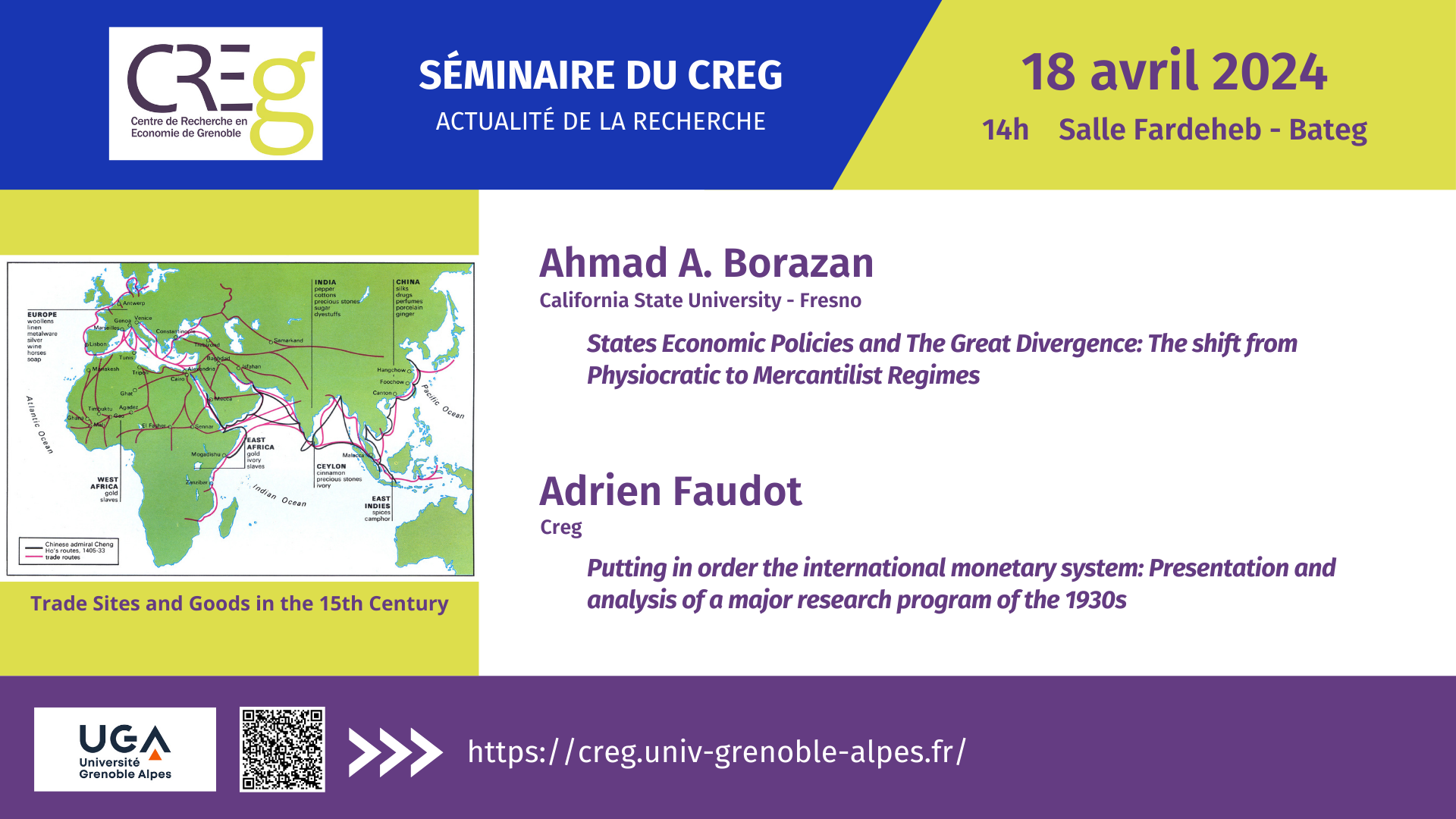- Imprimer
- Partager
- Partager sur Facebook
- Partager sur X
- Partager sur LinkedIn
Séminaire
Le 18 avril 2024

Le Creg vous invite à assister à son séminaire Actualité de la recherche.
Au programme de ce séminaire, deux présentations de travaux :
- States Economic Policies and The Great Divergence: The shift from Physiocratic to Mercantilist Regimes, Ahmad A. Borazan (California State University-Fresno)
Abstract: The paper revisits the question of the Great Divergence from a Middle Eastern perspective. It builds on the increasing recognition of the importance of state formation and state policies in long-term economic growth. It draws on the literature of the fiscal-military state and the new fiscal sociology to provide a comparative account of state formation and its economic policies in the Middle East vs the West. The paper’s main hypothesis is that the state’s main sources of revenues and fiscal constraints drive its policies toward economic development. Physiocratic states which could meet their needs through taxes on agricultural land did not prioritize having an active developmental policy towards their commercial sector. Meanwhile, in mercantilist states, barriers to high land taxation pushed the growing states to seek revenue in commercial activities, transforming it into a mercantilist regime characterized by a symbiotic relationship with the bourgeoisie. The evolution of the fiscal challenges and commercial policies of the Middle Eastern Second Mamluk state (1382-1517) serves as a natural experiment to evaluate this hypothesis. The unintended consequences of fiscal reforms -1340s- that accompanied a decline in agricultural revenues due to the Great Plague led to a system-wide fiscal crisis that pushed the state to seek active mercantilist policies to capture new sources of income. For a while, transforming the Egyptian state from a physiocratic regime into a regime that developed expansionist mercantilist policies to meet its fiscal needs.
- Putting in order the international monetary system: Presentation and analysis of a major research program of the 1930s, Adrien Faudot (Creg)
Abstract: My contribution will trace the development of international monetary reform projects, particularly those based on international clearing in the 1930s. These projects sought to respond to two problems: 1) the violent decline in international trade and the malfunctioning of the payments system at the time, and 2) the development of bilateralism, which had to be overcome within an multilateral framework. Initially, the idea grew in a few isolated minds, but it was to take shape as monetary institutions were transformed by the disintegration of the Genoa system. At first, economists sought to re-establish an order based on free trade and currency convertibility, but these attempts failed. The wartime economy from 1939 onwards made clearing desirable to many economists, even seducing Keynes. The aim of the paper is to show how the 1930s placed the re-establishment of an international monetary order at the heart of economists' discussions.
Date
14h-16h
Localisation
Séminaire hybride
- en présentiel : salle Fardeheb, 3e étage, Bateg, bâtiment Économie gestion sur le plan
- visioconférence Zoom
Télécharger
Affiche (DOCX, 2.87 Mo)
Discutant
Contact
creg univ-grenoble-alpes.fr (creg[at]univ-grenoble-alpes[dot]fr)
univ-grenoble-alpes.fr (creg[at]univ-grenoble-alpes[dot]fr)
- Imprimer
- Partager
- Partager sur Facebook
- Partager sur X
- Partager sur LinkedIn